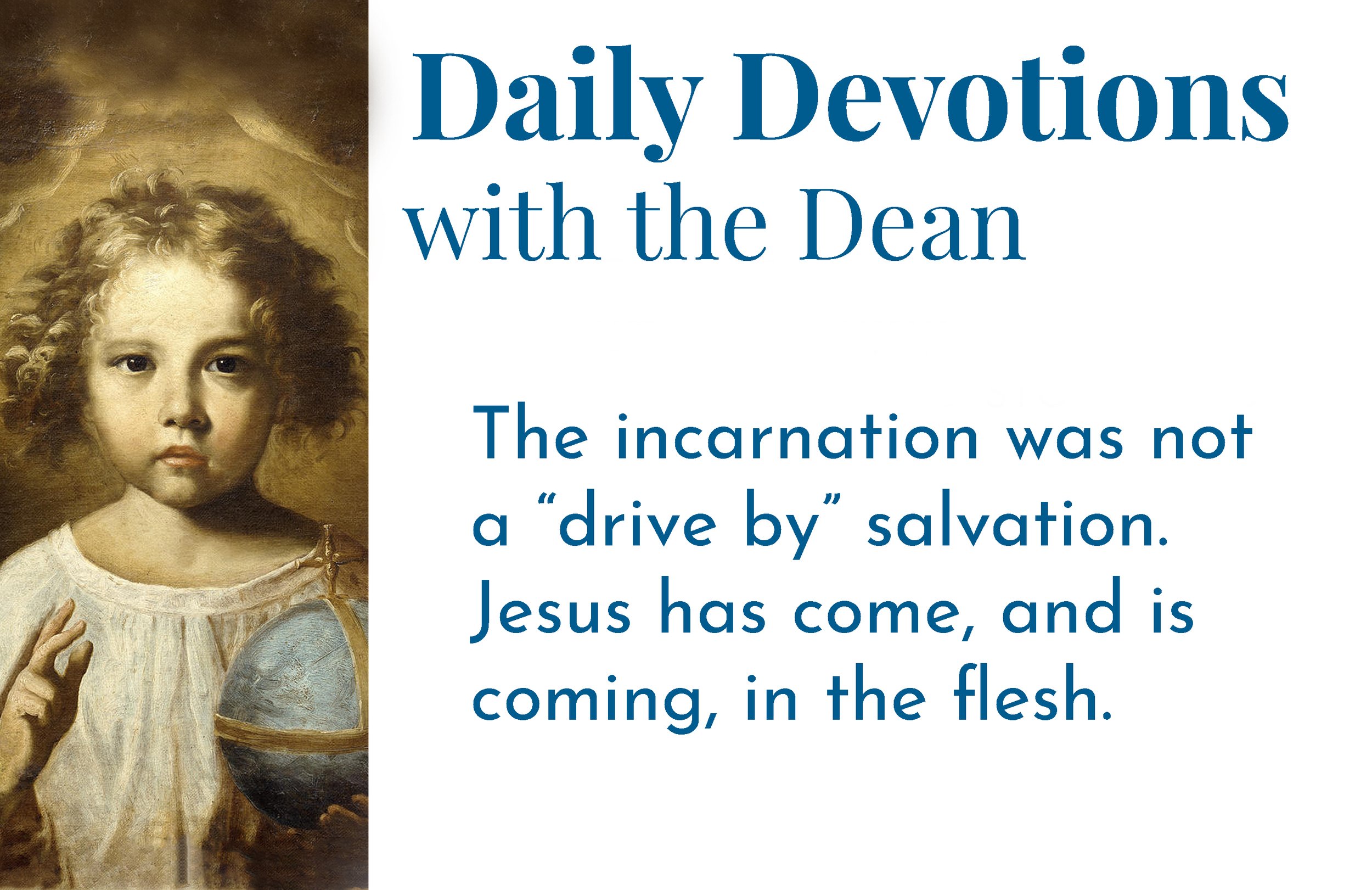Monday • 12/6/2021
We are taking a detour from the Daily Office readings for a few days. Instead, we are thinking through various facets of worship and how our Lord provides meaningful communion with him through our formal corporate worship as well as in individual worship in our daily devotions. The thoughts offered here are excerpts from articles I wrote for Worship Leader magazine a few years ago. We’ll resume our reflections on the Daily Office Monday, December 13.
Mystery Matters
Ahmed: Our religions are the same. You call him Elohim and I call him Allah. Both words mean the same thing: “God.” We both believe Jesus is God’s Son and was born of a virgin. We both believe he will come again at the end of time.
Me: But do you worship Jesus, Ahmed?
Ahmed: Of course not, that would be blasphemy! The Son is not the same as Allah.
Me: Then, no, friend, our religions are not the same.
In my conversation with Ahmed, I realized how easy Christianity’s “sell” would be if we could just accept the logic that if there is one and only one God, then Father, Son, and Holy Spirit can’t each be God.
The church of the first half-millennium bequeathed to us a fabulous gift: their stubborn refusal to surrender the lessons they had learned from Scripture and in worship to other voices.
One voice said: “Just put Jesus a little below the Father and as high above us as we wish. Make Jesus a fellow creature with us, one through whom we worship, but not one to whom we offer worship.”
Its opposite said: “Elevate Jesus so far above us that he becomes just a ‘face’ that God condescends to use to communicate with us without dragging him down to a material existence.”Make Jesus less than fully divine or less than fully human. Either way, he becomes more plausible, more understandable … more, well, marketable.
If early Christians had accepted either of these options – the one at the hands of Arians, the other at the hands of Gnostics – the church could have known early, easy success.
As it is, though, Scripture told our spiritual forebears that “the Word became flesh.” Worship taught them both sides of the equation: THE WORD became flesh, and the Word BECAME FLESH.
THE WORD: Only God Can Save
Scripture teaches truths that worship shapes into habits of the heart. One is that only God can save. Even Jesus’ enemies recognized that statements like “Rise, your sins are forgiven” were claims to deity. John the Baptist declared Jesus to be “the Lamb of God who takes away the sin of the world.” Instinctively, the church has translated that statement into prayer: “Lamb of God, you take away the sin of the world, have mercy on us.”
Early Christians cultivated the habit of praying to Jesus: “You are seated at the right hand of the Father. Receive our prayer. You alone are the Holy One, you alone are the Lord, you alone are the Most High, Jesus Christ, with the Holy Spirit, in the glory of God the Father. Amen.” Thus, they insulated themselves from claims that the Word is less than fully divine.
Most of us live in a cultural environment in which Jesus is considered a great man, perhaps larger than life, maybe even semi-divine. But not GOD. However, if he is not God, then he doesn’t really save. We’re left to try to save ourselves, however we define salvation. The greatest thing we can offer our secularist friends, our Muslim friends, our Jehovah’s Witness friends, is to worship not some generic “Lord,” but the distinctly Trinitarian God. This is the God who redeems – Father, Son, and Holy Spirit.
BECAME FLESH: Not a “Drive by”
To some people, it seemed (and still seems) unworthy of God to think of him actually becoming human. So they sought (and seek) to protect the purity of God by having a fully divine Christ, but one who sort of passed through Mary rather than took substance from her. Jesus’ humanity disappears, or at least withers. Unfortunately then, so does ours.
Most Christians, however, understand that since our problem – sin – includes body, mind, soul, and spirit, so does our solution. To heal us and rescue us, Jesus had to become one of us. The incarnation was not a “drive by” salvation. Jesus has come, and is coming, in the flesh (compare 1 John 2:26 & 2 John 7). Thus, we look for new bodies, not angels’ wings.
That’s why “matter matters” in worship. Baptismal waters are simultaneously “our tomb” (the death of the “old man”) and “our mother” (the birth of the “new man”), as Cyril, Jerusalem’s 4th century bishop put it. Anointing with oil at baptism (Greek: chrisma) makes us little “Christs.” Just as Jesus turned water into wine then, he now turns wine into blood, so that in Communion “we become one body and blood with Christ. In this way we become Christ-bearers (a Greek word from which comes the name ‘Christopher’) as his body and blood are spread around our limbs.” Thus, the kiss of peace at Communion is not just any old greeting, but an expression of “a union of souls.”*
Here’s what I wish I had thought to say to Ahmed: The difference in our religions is a mystery you more experience in worship than figure out in your head. We worship Jesus because it’s the Son’s divinity that gives him the right to forgive. And we worship alongside Jesus because the Son has become our brother and made his Father ours.
Be blessed this day,
Reggie Kidd+
* References in Cyril are to his Mystagogic Catecheses 2.4; 3.1; 4.3; 5.3, in Lester Ruth, et al., Walking Where Jesus Walked: Worship in Fourth-Century Jerusalem (Eerdmans, 2010).
Image: The Infant Jesus, oil on canvas, attributed to “Old Master,” Italian, 17th century


